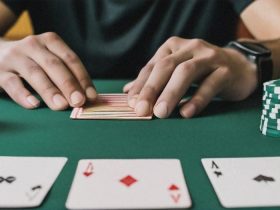In the sprawling digital halls of online casinos and the vibrant ambiance of physical establishments, the sheer variety of games available in 2025 can be overwhelming. From the iconic roulette wheel to the strategic depths of poker, each game promises unique thrills and potential rewards. However, one of the most underrated and crucial skills for any aspiring mr beast new app casino player isn’t about playing the game itself, but about choosing the right game in the first place.
The “right” game isn’t universally defined; it’s intensely personal. It depends entirely on your goals, your bankroll, your personality, and what you seek from your casino experience. Master the art of game selection, and you’ll play smarter, have more fun, and significantly improve your overall chances of a positive outcome.
Step 1: Define Your Goal – What Kind of Player Are You?
Before you even glance at the odds, ask yourself: What do I want to achieve?
- The Entertainer: “I just want to relax, enjoy the graphics, and have fun. Winning is a bonus, not the main objective.”
- Ideal Games: Slots (especially themed, low volatility), Keno.
- The Thrill Seeker / Big Win Hunter: “I’m looking for that life-changing jackpot, and I’m okay with long dry spells and higher risk.”
- Ideal Games: Progressive Jackpot Slots, some high-volatility slots, lottery-style games.
- The Strategist / Skill Enthusiast: “I love to think, make decisions, and feel like my choices genuinely impact the outcome. I want to minimize the house edge.”
- Ideal Games: Blackjack, Video Poker, Poker (player vs. player), certain Craps bets (with optimal strategy).
- The “Slow Burn” Player / Bankroll Preserver: “I want my money to last as long as possible, enjoy frequent small wins, and maximize my playtime.”
- Ideal Games: Low volatility slots, Blackjack (with basic strategy), European Roulette (even-money bets), Baccarat (Banker bet).
- The Social Butterfly: “I enjoy interacting with dealers and other players, soaking in the atmosphere.”
- Ideal Games: Live Dealer Casino Games (Blackjack, Roulette, Baccarat, Poker variants), physical casino table games.
Step 2: Evaluate Key Game Characteristics (The How-To of Selection)
Once you know your goal, apply these analytical filters to narrow down your choices:
-
House Edge / Return to Player (RTP):
- What it is: The casino’s mathematical advantage (House Edge) or the theoretical percentage of wagers returned to players (RTP).
- Skill in Selection: Prioritize games with a lower house edge (e.g., 1% or less) or a higher RTP (e.g., 96% or more). This directly translates to better long-term value.
- Example: Always choose European Roulette (2.7% HE) over American Roulette (5.26% HE). Some online slots have significantly better RTPs than others.
-
Volatility / Variance:
- What it is: The risk level of a game. High volatility means less frequent but larger wins; low volatility means more frequent but smaller wins.
- Skill in Selection: Match the game’s volatility to your bankroll size and risk tolerance.
- Example: A player with a small bankroll wanting longer play should avoid high-volatility progressive jackpot slots, opting for lower-volatility games that pay out more often.
-
Skill vs. Pure Chance:
- What it is: Does your decision-making influence the outcome?
- Skill in Selection: If you enjoy strategic thinking and want to reduce the house’s edge through smart play, gravitate towards skill-based games. If you prefer pure, unadulterated luck with no decisions, pure chance games are for you.
- Example: Blackjack (skill) vs. Slots (pure chance); Video Poker (skill) vs. Keno (pure chance).
-
Pace of Play:
- What it is: How quickly hands or rounds are completed.
- Skill in Selection: Faster games can deplete your bankroll more rapidly. Consider if you prefer a quick burst of action or a more drawn-out session.
- Example: Online slots and Baccarat can be incredibly fast. Poker, especially multi-table tournaments, can be very slow and strategic.
-
Betting Limits (Table Minimums/Maximums):
- What it is: The minimum and maximum bets allowed at a table or on a machine.
- Skill in Selection: Ensure the minimum bet aligns with your bankroll management strategy (e.g., your unit bet should be a small percentage of your session bankroll). Don’t sit at a table where the minimum bet is too high for your comfort level.
-
Social vs. Solitary Experience:
- What it is: Do you want interaction with others or a solo experience?
- Skill in Selection: Live dealer games or physical casino tables offer social interaction. Standard online slots, video poker, or single-player roulette are solitary.
Step 3: Practical Steps for Refining Your Selection Skills
- Research, Research, Research: Never just jump into a game blindly. Read reviews, check RTPs, and understand the rules and common strategies before committing real money.
- Utilize Free Play / Demo Modes: This is your risk-free training ground. Test out different games to see if their mechanics, pace, and volatility suit your style before spending a single dollar.
- Start Small: When trying a new real-money game, begin with the lowest possible stakes to get a feel for it without significant financial risk.
- Observe and Learn: If possible, watch others play (in a physical casino or via live dealer streams). See how the game flows and how experienced players approach it.
- Don’t Be Afraid to Change: Your goals or preferences might evolve. Don’t feel locked into one game. The skilled player is adaptable and willing to switch games to match their current needs.
Mastering game selection is a crucial skill for any strategic casino player. It’s about being intentional with your entertainment budget and maximizing your chances of achieving your personal goals. By thoughtfully evaluating games based on your preferences, the underlying mathematics, and strategic opportunities, you transform from a casual gambler into a shrewd decision-maker, making every visit to the casino a more enjoyable and potentially rewarding experience.















Leave a Reply